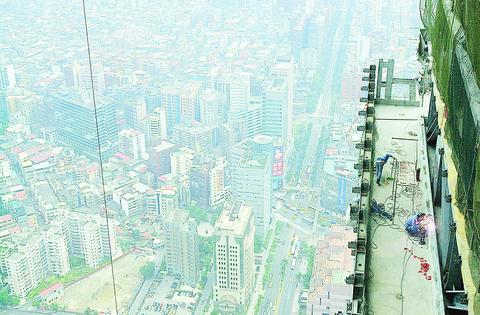Four international hoteliers are jockeying for a spot in Taipei 101 and the right to be called one of world's highest hotels, executives of the 508m skyscraper said yesterday.
The hotels include the Four Seasons Hotels and Resorts, the Ritz-Carlton, the St. Regis and the Le Meridien which enjoys a strategic alliance with Japan's Nikko Hotel.

PHOTO: GEORGE TSORNG, TAIPEI TIMES
"Four Seasons is aggressively negotiating with us," said Scott Chen (
"We're in constant contact -- about twice a week by phone and e-mail," he said.
The proposed five-star hotel would occupy approximately 300 rooms and be located on floors 67 through 84, with an exclusive shuttle elevator taking guests directly to the hotel's 67th floor lobby, said Matthew Shaw, director of Jones Lang LaSalle Taiwan, the primary leasing agent for the Taipei 101 tower.
Only the Grand Hyatt Shanghai, located in the Jin Mao Building, would have one floor of rooms higher, boasting the world's highest hotel rooms on the 85th floor.
TFCC management team floated the tower hotel proposal two months ago, and the response has been excellent, Shaw said. More than seven hotels contacted top brass at Taipei Financial, which narrowed the list to four.
Competition is tight as "there is a fundamental lack of five-star hotel property in Taipei," Shaw said.
Construction of the 101-floor, 60,000-ping (198,000m2) office tower is slated to be completed in October next year. The tower is now 90 stories high.
Market watchers have speculated that office rents in Taipei 101 may hover above NT$4,000 per ping after the skyscraper opens next year, but Shaw dismissed the claims, saying that figure is far from accurate.
"There is a shortage of Grade A space, but to charge in excess of NT$4000 per ping would be unrealistic."
Shaw added that Taipei 101 would set a new office real estate benchmark for others to follow.
According to a market report by the CB Richard Ellis Ltd, premium grade offices rents have slid 3.03 percent from NT$2,427 to NT$2,353 per ping each month since the beginning of the year. And with new office space in the pipeline, rents are expected to continue to drop in the near future, the report said.
In addition to the prospective hotel, the most important anchor tenant of the new building will be the Taiwan Stock Exchange Corp (
"The Taiwan Stock Exchange will occupy about seven floors in the building, or about 6,000 pings," according to administrative vice president Terry Shen (
"Also one of our shareholders -- Chinatrust Commercial Bank (
Meanwhile, executives yesterday also said they are close to finalizing a deal with Pacific Sogo Department Store (太平洋崇光百貨) to rent 1,000 pings (3,305m2) in the adjacent 23,000-ping (76,027m2), four-floor shopping mall.
The Sogo deal should be concluded within 10 days and 88 percent of retail space is already full, said Simon Van de Velde, senior development, leasing and marketing manager at Lend Lease Pty Ltd Taiwan.
The mall is slated to formally open on Nov. 14.

BYPASSING CHINA TARIFFS: In the first five months of this year, Foxconn sent US$4.4bn of iPhones to the US from India, compared with US$3.7bn in the whole of last year Nearly all the iPhones exported by Foxconn Technology Group (富士康科技集團) from India went to the US between March and last month, customs data showed, far above last year’s average of 50 percent and a clear sign of Apple Inc’s efforts to bypass high US tariffs imposed on China. The numbers, being reported by Reuters for the first time, show that Apple has realigned its India exports to almost exclusively serve the US market, when previously the devices were more widely distributed to nations including the Netherlands and the Czech Republic. During March to last month, Foxconn, known as Hon Hai Precision Industry

Taiwan Semiconductor Manufacturing Co (TSMC, 台積電) and the University of Tokyo (UTokyo) yesterday announced the launch of the TSMC-UTokyo Lab to promote advanced semiconductor research, education and talent development. The lab is TSMC’s first laboratory collaboration with a university outside Taiwan, the company said in a statement. The lab would leverage “the extensive knowledge, experience, and creativity” of both institutions, the company said. It is located in the Asano Section of UTokyo’s Hongo, Tokyo, campus and would be managed by UTokyo faculty, guided by directors from UTokyo and TSMC, the company said. TSMC began working with UTokyo in 2019, resulting in 21 research projects,

Taiwan’s property market is entering a freeze, with mortgage activity across the nation’s six largest cities plummeting in the first quarter, H&B Realty Co (住商不動產) said yesterday, citing mounting pressure on housing demand amid tighter lending rules and regulatory curbs. Mortgage applications in Taipei, New Taipei City, Taoyuan, Taichung, Tainan and Kaohsiung totaled 28,078 from January to March, a sharp 36.3 percent decline from 44,082 in the same period last year, the nation’s largest real-estate brokerage by franchise said, citing data from the Joint Credit Information Center (JCIC, 聯徵中心). “The simultaneous decline across all six cities reflects just how drastically the market

Ashton Hall’s morning routine involves dunking his head in iced Saratoga Spring Water. For the company that sells the bottled water — Hall’s brand of choice for drinking, brushing his teeth and submerging himself — that is fantastic news. “We’re so thankful to this incredible fitness influencer called Ashton Hall,” Saratoga owner Primo Brands Corp’s CEO Robbert Rietbroek said on an earnings call after Hall’s morning routine video went viral. “He really helped put our brand on the map.” Primo Brands, which was not affiliated with Hall when he made his video, is among the increasing number of companies benefiting from influencer